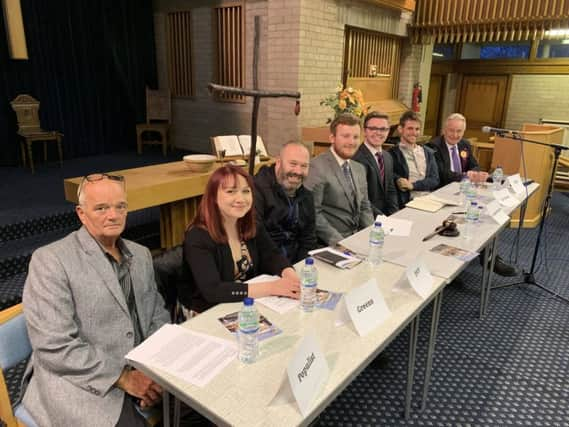Labour boycotts Sunderland local elections debate


Instead of the UK’s departure from the EU, it was the Labour Party refusal to attend last week’s debate that was one of the hottest topics of the night.
Without the company of the city’s ruling group, representatives from the Conservative Party, the Liberal Democrats, the Green Party, UKIP, the Democrats and Veterans Party (DVP) and the Populist Party took questions on their policies at Fulwell Methodist Church.
Advertisement
Hide AdAdvertisement
Hide AdStephen O’Brien, a Liberal Democrat city councillor, labelled Labour ‘shameful’ for declining an invitation to appear and defend the way the party has run the city.
Graeme Miller, the leader of Sunderland City Council, cited concerns about what he called the ‘far right’ politics of Sunderland for Transparency, the group which organised the debate – an accusation it has denied.
Litter and fly-tipping provoked several eye-catching suggestions from candidates.
Advertisement
Hide AdAdvertisement
Hide AdThis included a proposal by Tony Morrow, of the Populist Party, that anyone caught should face the prospect of being ‘named and shamed’ on posters across the city – as well as punitive fines.
A toned-down alternative was put forward by Conservative city councillor Antony Mullen, who called for an independent ‘arms length’ organisation to be created by the council specifically to enforce littering, dog fouling and fly-tipping rules.
The Lib Dems, Greens and UKIP however were united on an overhaul of fees for bulky waste collections or use of council tips to deter fly-tipping.
All the parties were critical of housing policies in the city, especially the use of greenbelt land for development.
Advertisement
Hide AdAdvertisement
Hide AdCoun O’Brien called for more social housing and less executive housing.
But Coun Mullen said his party was in favour of more executive housing to increase the amount of council tax available to collect and avoid further increases in bills.
Both councillors faced a threat to their jobs in the suggestion from Rachel Featherstone, of the Green Party, to cutting the council’s burden on households, which was to cut the number of city councillors – possibly to as few as 30.
Meanwhile, DVP’s Glyn Dixon said his party’s flagship policy would be the use of referendums to allow the public to rule on such measures themselves.
Advertisement
Hide AdAdvertisement
Hide AdFollowing the debate, the event’s organiser Christopher Marshall, who started up Sunderland for Transparency, said he thought it had been a successful event despite the absence of the Labour Party.
He added: “I think it’s disappointing Labour didn’t turn up, it could have added something to the debate and given answers we couldn’t get from the panellists.
“I was run quite impartially, so maybe they will reconsider coming in the future.”
James Harrison
James Harrison , Local Democracy Reporting Service